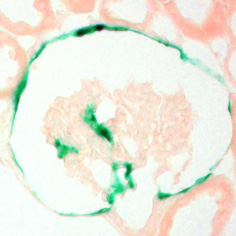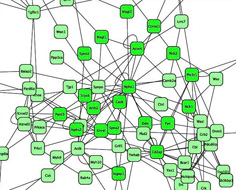Chronic kidney disease is a major and increasing health problem in industrialized countries. By the end of 2005, 87,151 patients with end-stage kidney disease were treated in Germany for which more than 2 billion EUR have to be spent per year. In more than 50% of the cases, end-stage renal disease develops from glomerular disease. Over the last years it has been shown that degenerative diseases of the glomerulus are mostly initiated by the damage and loss of podocytes. Podocytes are terminally differentiated cells that are unable to replicate.
Only recently a member of the consortium has obtained unequivocal evidence from transgenic mice that parietal epithelial cells (PECs) replenish podocytes (Appel et al., J. Am. Soc. Nephrol. 20: 333-43, 2009), however at a very low rate. This finding demonstrates that PECs are progenitor cells, and opens up the exciting perspective to develop therapeutics that prevent glomerular deterioration by speeding up the replenishment of podocytes from resident adult progenitor PECs.
The consortium aims to elucidate the process of differentiation from progenitor PECs into podocytes. To this end, transgenic mice will be generated that possess GFP-tagged podocytes and PECs, respectively. Podocytes and PECs, including adult multipotent progenitors, will be isolated from transgenic mice and the respective transcriptomes will be determined. Interaction/ regulation network analysis using bioinformatics tools will be employed to identify master regulators for the differentiation of PECs into podocytes. Based on these insights, differentiation will be manipulated in PEC cell lines and monitored in transgenic mice and human tissue.






